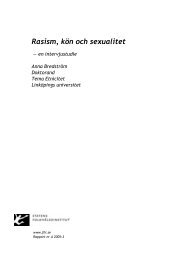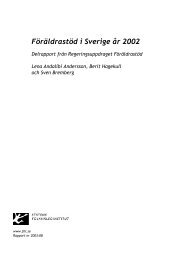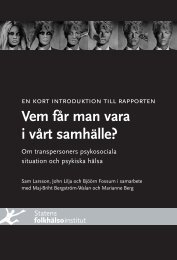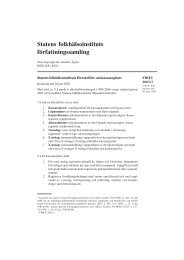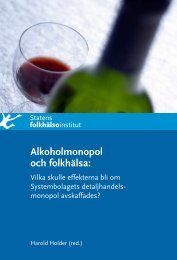Gambling motivation and involvement: A review of social
Gambling motivation and involvement: A review of social
Gambling motivation and involvement: A review of social
Create successful ePaper yourself
Turn your PDF publications into a flip-book with our unique Google optimized e-Paper software.
Comprehensive models<br />
<strong>of</strong> gambling behavior<br />
thiS SEctiOn diScuSSES comprehensive <strong>and</strong> general models <strong>of</strong> gambling behavior.<br />
These can be viewed as belonging to two general types: <strong>motivation</strong>al models <strong>and</strong><br />
<strong>involvement</strong> models. The first, <strong>motivation</strong>al models, concern motives for participating<br />
in gambling, <strong>and</strong> the second, <strong>involvement</strong> models, provide schemes explaining<br />
varying degrees <strong>of</strong> <strong>involvement</strong> in gambling.<br />
Motivational models<br />
When individuals are asked in questionnaires as to their reasons for gambling, the<br />
alternative “to win” or “to win money” is <strong>of</strong>ten the most common pick [56p. 3.13 ,<br />
96p. 144 , 412]. This is natural, since money is the tangible reward <strong>of</strong> gambling [106p. 30 p. 160 ], which makes money “the dominant language <strong>of</strong> gambling” [194 ]. However,<br />
everyone with any experience <strong>of</strong> gambling knows that the motives for participating<br />
vary considerably between games <strong>and</strong> gamblers.<br />
In order to provide insight into why people gamble, scholars may identify various<br />
motives for gambling that they have uncovered in the course <strong>of</strong> their research.<br />
The identification <strong>of</strong> motives may result in a plain enumeration <strong>of</strong> them or in a<br />
model. The motives provide an answer to the question: “Why do people participate<br />
in (this type <strong>of</strong>) gambling?” From a leisure study perspective for instance, it<br />
has been argued, as outlined earlier, that recreational casino gambling in the USA<br />
has eight <strong>motivation</strong>al components [191], gambling as: learning <strong>and</strong> evaluating, a<br />
“rush”, self-definition, risk-taking, self-classification, emotional self-classification,<br />
competing, <strong>and</strong> communing. A study <strong>of</strong> betting behavior concluded that there were<br />
four principal motives for betting on horses in the UK: financial gain, intellectual<br />
challenge, excitement, <strong>and</strong> <strong>social</strong> interaction [186]. A quantitative Korean study<br />
revealed five factors that motivated gambling: <strong>social</strong>ization, amusement, avoidance,<br />
excitement, <strong>and</strong> monetary motives [413]. A study in New Zeal<strong>and</strong> revealed eighteen<br />
motives for starting to gamble <strong>and</strong> thirteen for continuing [414].<br />
The present author has, from an anthropological perspective <strong>and</strong> on the basis <strong>of</strong><br />
participant observation in a wide variety <strong>of</strong> Swedish gambling settings, developed<br />
a comprehensive <strong>motivation</strong>al model for leisure gambling [415]. Of the model’s<br />
five motives, four are optional <strong>and</strong> may be present to varying extents <strong>and</strong> in varying<br />
combinations in specific games, <strong>and</strong> may be perceived as motivating to varying<br />
degrees depending on the individual gambler’s disposition <strong>and</strong> preferences. The fifth<br />
motive is essential to gambling <strong>and</strong> always present.<br />
58 G A M B L I N G M O T I VAT I O N A N D I N V O LV E M E N T




